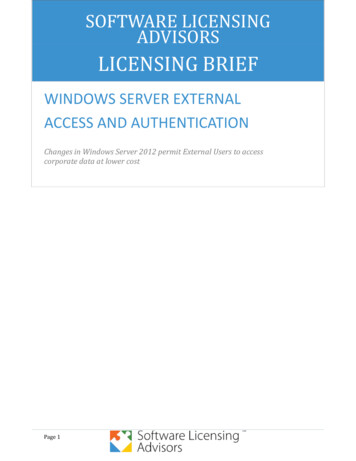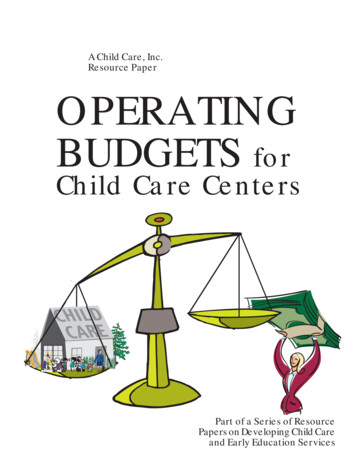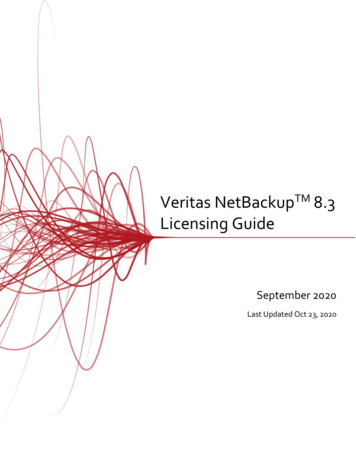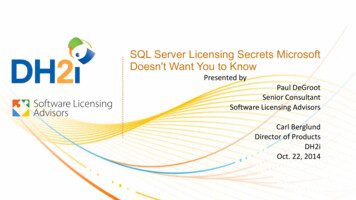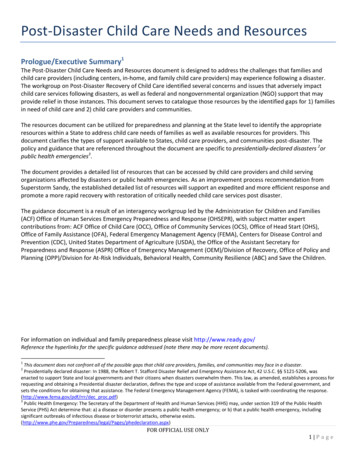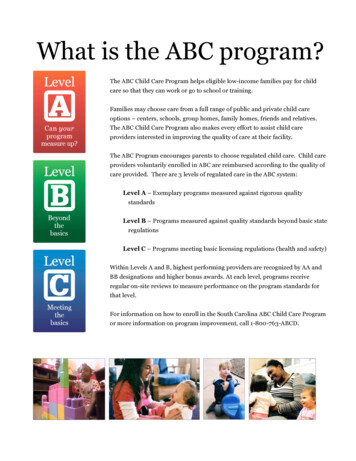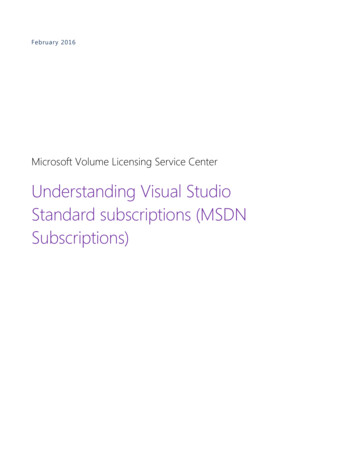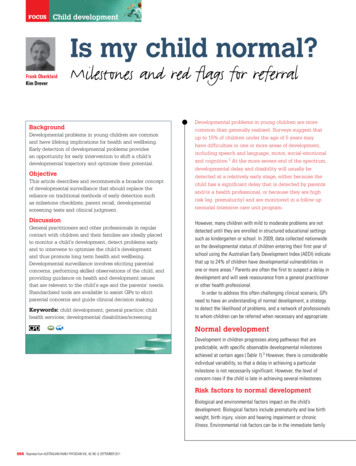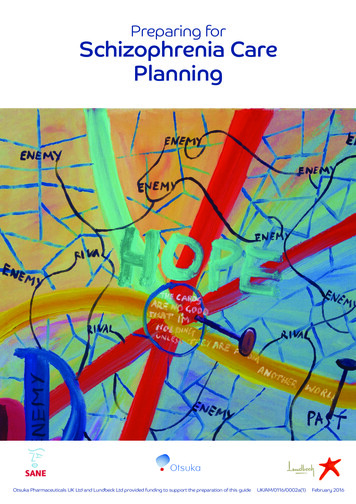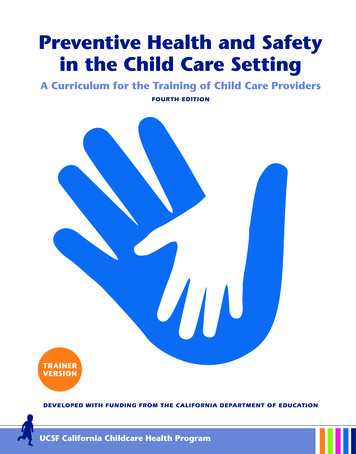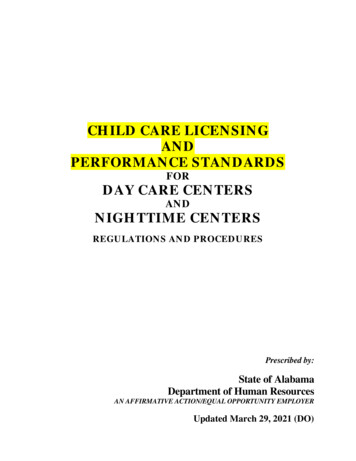
Transcription
CHILD CARE LICENSINGANDPERFORMANCE STANDARDSFORDAY CARE CENTERSANDNIGHTTIME CENTERSREGULATIONS AND PROCEDURESPrescribed by:State of AlabamaDepartment of Human ResourcesAN AFFIRMATIVE ACTION/EQUAL OPPORTUNITY EMPLOYERUpdated March 29, 2021 (DO)
1
CHILD CARE LICENSINGANDPERFORMANCE STANDARDSFORDAY CARE CENTERS ANDNIGHTTIME CENTERSREGULATIONS AND PROCEDURESPrescribed bySTATE OF ALABAMADEPARTMENT OF HUMAN RESOURCESAN AFFIRMATIVE ACTION/EQUAL OPPORTUNITY EMPLOYER1974Revised 1978Revised 1980Revised 1982Revised 1988Revised 2001Revised 2002Revised 2003Revised 2004Revised 2005REPRINTED 2006Revised 2006Revised 2007REPRINTED April 2009Revised 2018Revised 2019Revised 20212
TABLE OF CONTENTSI. LEGAL AUTHORITY . 6II.REGULATIONS . 7A.Definitions .7B.Licensing Procedures .7.E.1.2.F.1.2.3.4.G.1.Application for a License . 11Prohibited Advertisement . 11Examination and Investigation of the Application . 12Disposition of the Application . 12Six-Month Permit. 12Renewal of a License . 12Department Visits, Inspections, Investigations, Examinations, and Consultation . 13Provisions of the License, Six-month Permit, or Approval . 13Facilities.15Fire Inspection . 15Health Inspection . 15Zoning Approval . 15Indoor Area . 15Outdoor Area . 18Swimming and Wading at the Center . 19Away from center activities . 20Furnishings and Equipment . 20Child Care Program.22Staffing. 22Infant/Toddler Daily Program. 24Preschool/School-age Children - Daily Program . 28Disciplinary Practices . 31Staff-Parent Communication . 32Health Information . 32Emergency Preparedness and Response Plans . 35Transportation.37Transportation Provided by the Center . 37Transportation Provided by Parent(s)/Guardian(s) or Other Designated Person(s) . 39Staff .40Qualifications of Staff . 40Records on Staff . 42Health - Staff . 44In-Service Training for Staff . 45Character and Suitability .46Character and suitability review . 463
2.H.1.2.3.4.5.6.I.Factors to be considered. 47Administration.51Applicant/Licensee . 51Reports to the Department . 51Admission Procedures . 52Children's Records . 53Center Records . 54Documents to be posted in a conspicuous place in the center . 54Nighttime Centers .551.2.Equipment and furnishings . 55Child Care Program . 56J. Corrective and Adverse ficiency Report . 57Corrective Action . 57Restriction or Modification of the Provisions of the License, Permit, or Approval . 58Probationary Status . 58Revocation of a License . 59Suspension of a License, Permit, or Approval . 59Penalty for Unlicensed Facilities . 60Refusal to Permit Inspections . 60Hearings and Appeals .61Pre-revocation Hearings. 61Request for a Fair Hearing . 61Conduct of a Fair Hearing. 62Required Equipment List .630 up to 18 months. 6318 months up to 2½ years . 6324 months up to 36 months . 642½ years up to 6 years. 646 years and older . 65Playground Equipment. 66III. APPENDICES . 67A.B.C.D.E.F.G.H.I.J.K.Application for a license to operate a day care/nighttime center . 67Licensing application attachment . 73Medical report for persons giving care to children . 76Application form for staff . 77Reference form. 80Verification that staff persons have read the Standards . 82Child's preadmission record . 83Authorization for administering medication . 85Injury/illness report form . 86Sign in/sign out form . 87Sample operating policies . 894
L.M.N.O.Sample schedule . 90Public notice form . 91Transportation checklists . 92Vehicle inspection sheet . 955
I.LEGAL AUTHORITYThe legal authority for regulation of child care is based on:Child Care Act of 1971-Title 38, Chapter 7, Code of Alabama 1975, 38-7-1 et. seq. (Acts1971, 3rd Ex. Sess. No. 174, p. 4423, Sections 1 - 18.) and 38-7-14.1 Sections 1-2.Title 41, Chapter 22, Section 19, 41-22-19, see also 41-22-1 et. seq.Title 26, Chapter 14, 26-14-1 et. seq.Administrative Code, Section 660-5-26Hearings and Appeals (See Section K, page 61)Child Care and Development Block Grant “CCDBG” Act of 2014Child Care Safety Act #2018-278U.S. Consumer Product Safety Improvement Act of 20086
II. REGULATIONSA.DefinitionsIn the context of these regulations, the following definitions apply.1.ADULT. Any person 19 years of age or older.2.AIDE. A person who does not meet the qualifications of a child care worker/teacher, worksunder the direct supervision of a qualified childcare worker/teacher and is not counted in therequired staff-child ratios.3.BIO CONTAMINANTS. A living organism or product that can harm animals or humans ifinhaled, swallowed or otherwise absorbed into the body.4.CHARACTER AND SUITABILITY. The person maintains business, professional,family, and community relationships which are characterized by honesty, fairness,truthfulness, and concern for the well-being of others to the extent that the person isconsidered suitable to be entrusted with the care, guidance, and protection of children.5.CHILD. Any person under 19 years of age.6.CHILD ABUSE AND NEGLECT. According to the Code of Alabama 1975, Section 2614-1, abuse is defined as harm or threatened harm to a child's health or welfare. Harm orthreatened harm to a child's health or welfare can occur through nonaccidental physical ormental injury, sexual abuse or attempted sexual abuse or sexual exploitation or attemptedsexual exploitation. "Sexual abuse" includes the employment, use, persuasion, inducement,enticement, or coercion of any child to engage in, or having a child assist any other person toengage in, any sexually explicit conduct or any simulation of the conduct for the purpose ofproducing any visual depiction of the conduct; or the rape, molestation, prostitution, or otherform of sexual exploitation of children, or incest with children as those acts are defined byAlabama law. "Sexual exploitation" includes allowing, permitting, or encouraging a child toengage in prostitution and allowing, permitting, encouraging or engaging in the obscene orpornographic photographing, filming, or depicting of a child for commercial purposes.Neglect is defined as negligent treatment or maltreatment of a child, including the failure toprovide adequate food, medical treatment, supervision, clothing or shelter.7.CHILD CARE WORKER/TEACHER. A person having primary responsibility for thecare of a group of children and meeting the specified qualifications, who may be counted inthe required staff-child ratio while he/she is giving direct care to the children.8.COMMISSIONER. The Commissioner of the Alabama State Department of HumanResources.9.DAY CARE CENTER. In the context of these regulations, day care shall begin no earlierthan 5:00 a.m. Nighttime care shall begin at 7:00 p.m. Additional requirements for centers7
operating after 7:00 p.m. and for centers operating past midnight can be found in Section I.,Nighttime Care. A day care center is defined in the Code of Alabama 1975, Section 38-7-2,(4) as follows. Any child-care facility receiving more than twelve (12) children for daytimecare during all or part of a day. The term includes, but is not limited to, facilities commonlycalled "child-care centers", "day nurseries", "nursery schools," “pre-kindergartens,”“preschools,” "kindergartens," and "play groups," with or without stated educationalpurposes. The term further includes, but is not limited to, pre-kindergarten, preschool,kindergarten or nursery schools or other daytime programs operated as a part of a privateschool and receiving children younger than lawful school age for daytime care for more thanfour hours a day, with or without stated educational purposes. The term does not includeany of the following:(a) Kindergartens, nursery schools, or other daytime programs operated by publicelementary systems or secondary level school units or institutions of higher learning;(b) Kindergartens, nursery schools, or other daytime programs, with or without statededucational purposes, operating no more than four (4) hours a day and receiving childrenyounger than lawful school age.(c) Kindergartens or nursery schools or other daytime programs operated as a part of aprivate school and receiving children younger than lawful school age for four (4) hours aday or less, with or without stated educational purposes;(d) Facilities operated for more than four (4) hours a day in connection with a shoppingcenter or service or other similar facility, where transient children are cared fortemporarily while parents or custodians of the children are occupied on the premises orare in the immediate vicinity and readily available; provided, however, that suchfacilities shall meet local and state fire and health requirements;(e) Any type of day care center that is conducted on federal government premises; or(f) Special activities programs for children of lawful school age including, but not limitedto, athletics, crafts instruction and similar activities conducted on an organized andperiodic basis by civic, charitable and governmental organizations; provided, however,that local and state fire and health requirements are met.10.DEPARTMENT. The State or County Department of Human Resources.11.DEPARTMENT'S REPRESENTATIVE. An employee or designee of the State orCounty Department of Human Resources, acting as the authorized agent of theCommissioner in carrying out the responsibilities and duties specified in Code of Alabama1975.12.DIRECTOR or CENTER DIRECTOR. The staff person responsible for the day to dayoperation and management of the center including supervision of the planning andimplementing of the children's daily activities and supervision of staff.13.EARLY INTERVENTION SERVICES STAFF/VENDORS. A person employed by theAlabama Department of Rehabilitation Services or a vendor thereof, who provided directservices to children in licensed centers. Early Intervention services may include, but are notlimited to, any developmental delay of twenty-five per cent in any developmental area,speech therapy, hearing, vision, physical therapy, occupational therapy, or other services.Service providers are not considered center staff and are not required to have a record on file8
at the center. When the services are provided to a child in a licensed child care center, theindividual shall present photographic identification verifying employment with theDepartment of Rehabilitation Services or the vendor thereof and a copy of their suitabilityletter documenting that a criminal history background check has been performed and theindividual has been determined suitable.14.FACILITY FOR CHILD CARE or CHILD-CARE FACILITY. A facility establishedby any person, group of persons, agency, association or organization, whether establishedfor gain or otherwise, who or which receives or arranges for care or placement of one ormore children, unrelated to the operator of the facility, apart from the parents, with orwithout the transfer of the right of custody, in any facility as defined in this chapter,established and maintained for the care of the children.15.GROUP SIZE. The term group size is determined by the capacity of the room, age of thechild, number of staff, and amount of equipment.16.LAWFUL SCHOOL AGE. For purposes of these regulations, this term includes childrenwho are five (5) years of age on or before September 1, (or the date on which school beginsin the enrolling district pursuant to Code of Alabama 1975, § 16-28-4) of a given year. Thisdefinition corresponds with the minimum age at which a child is entitled to admission topublic school kindergarten.17.LICENSEE. Any person, group of persons, or corporation, to whom the license, permit, orapproval is issued.18.NIGHT CARE FACILITY. A child-care facility which is a center or a family homereceiving a child or children for care after 7:00 p.m. Additional requirements for centersoperating after 7:00 p.m. and for centers operating past midnight can be found in Section I.,page 55, Nighttime Care.19.NIGHTTIME CENTER. A facility which is established to receive more than twelve (12)children for nighttime care after 7:00 p.m. Additional requirements for centers operatingafter 7:00 p.m. and for centers operating past midnight can be found in Section I., page 55,Nighttime Care.20.PARENT(S)/GUARDIAN(S). The parent(s) or legal guardian(s) or legal custodian, of thechild enrolled or in the process of being enrolled in a childcare center.21.RESOURCE PERSON. A person who visits the center for the purpose of enhancing theprogram, has no direct responsibility for the care of the children, is not counted in therequired staff-child ratios, is constantly supervised by staff and is never alone with a childor children.22.SPECIAL EDUCATION SERVICES STAFF. Personnel employed by the AlabamaDepartment of Education or local school system who provide special education services tochildren in licensed centers and are certified teachers or certified therapists. Specialeducation services may include but are not limited to speech therapy, physical therapy,9
occupational therapy or other services specified in an Individualized Education Plan (IEP).Special Education Services Staff are not considered center staff and are not required tocomply with the regulations for center staff or to have a record on file in the center. Foreach child receiving special education services, the Alabama Department of Education orthe local school system shall provide the center with a copy of the child's IEP, includingsigned permission from the child's parent(s)/guardian(s) for the child to receive services.When Special Education Services Staff provide services to a child in a licensed child carecenter, the individual shall present photographic identification verifying employment withthe Department of Education or the local school board and a copy of their suitability letter,documenting that a criminal history background check has been performed by theDepartment of Education and the individual has been determined suitable.23.STAFF or CENTER STAFF. Administrative, program, or service personnel, whether paidor unpaid, including the licensee when the licensee is an individual. Special EducationServices Staff and Early Intervention Services Staff and Vendors in the precedingdefinitions are excluded.24.SUPERVISION. Responsibility for each child and accountability for his/her care by givingdirect and full attention to the children.25.UNIVERSAL PRECAUTIONS. Safety procedures established to reduce the spread ofinfectious disease through blood and bodily fluids.10
B.Licensing Procedures1.Application for a Licensea.b.c.d.e.2.Child care (daycare or nighttime care) shall not be provided or advertised prior toissuance of a license, six-month permit, or approval.Any person, group of persons or corporation may obtain an application form for alicense to operate a child care center by contacting the Department of HumanResources. (See Code of Alabama 1975 Section 38-7- 4).An application for a license to operate a child care center shall be made to theDepartment of Human Resources on the required form(s) and shall contain allinformation requested on the form(s). (See Appendix A, page 67, for requiredform(s).) A separate application shall be submitted for each proposed center.An application for a license is not transferable from one person, group of persons, orcorporation to another or from one location to another.The Licensing Application Attachment shall be submitted to the Department, onthe required form, prior to a license, six-month permit, or approval being issued.(See Appendix B, page 73, for required form.)Prohibited Advertisementa.b.c.No person, unless licensed or holding a six-month permit, may cause to be publishedany advertisement which solicits a child or children for care. To solicit a child orchildren for care means, among other similar actions or terms, to invite, appeal,plead, lure, beg, request, offer, suggest, promote, or implore. Both free and paidadvertisement is prohibited. (See Code of Alabama 1975).Prohibited advertisement includes, but is not limited to, printed and publishedmaterial; descriptive literature and aids; speeches, talks, and presentations; flyers;booklets and pamphlets; signs and posters; illustrations and depictions;newspaper, radio, television, magazine, Internet, and other media advertising;letters and direct mail advertising; and any materials used by agents. Prohibitedadvertisement also includes printed and illustrated material or descriptions oncups, mugs, pens, pencils, or other objects.The following activity does not constitute prohibited advertisement:(1)Advertisement using a name and address seeking employment applicationsfor staff positions; provided that a license application has been filed withthe Department and the advertisement includes the clearly visible phrase,“license application pending.”(2)“Under Construction,” “Renovation,” or “Remodeling” signs (with orwithout name and address) on the premises; provided that a licenseapplication has been filed with the Department and the sign includes theclearly visible phrase, “license application pending.”11
(3)3.Examination and Investigation of the Applicationa.b.4.c.When standards for the operation of a center have been met, a license will be issued.If an application is denied, the Department shall notify the applicant of the decisionin writing, indicating the reason(s) for the denial.The applicant may withdraw the application either verbally or in writing.Six-Month Permita.b.c.d.e.f.6.After receipt of the completed application, a representative of the Department ofHuman Resources will examine the premises proposed for the center and willinvestigate the person(s) responsible for the center.The examination and investigation will be based on the standards and regulations asprescribed and published by the Department.Disposition of the Applicationa.b.5.A market survey to determine the need for child care in a locality. Usingthe name and address of the business or individual is permitted so long asit does not solicit a child or children for care or promote the business.The Department may, at its discretion, issue one (1) six-month permit to allow theapplicant/center reasonable time to become eligible for a full license. Before a sixmonth permit is issued by the Department, all standards shall be met with theexception of one half of the required equipment, indoor and outdoor, for each agegroup to be served. (See Section L., page 63, for Required Equipment Lists.)The total number of children in the care of the center at any given time, includingchildren on the premises (inside and outside), children in transit, children on fieldtrips, or other center activities, shall not exceed the number specified on the permit.The age range of the children served shall not vary from the limits specified on thepermit.The permit is not transferable from one person or group of persons or corporation toanother, nor from one building or location to another.During the six-month permit period, the initial application for a license remainspending. A two-year license will be issued when the center meets standards.If the application is denied for failure to meet standards during the six-month permitperiod, the center shall not continue to operate.Renewal of a License12
a.b.c.d.e.7.Department Visits, Inspections, Investigations, Examinations, and Consultationa.b.c.d.e.f.8.Application for renewal of a license to continue operating a child care center shall bemade to the Department at least thirty (30) calendar days prior to the expiration dateof the current license, and shall be on the required form(s). (See Appendix A, page67, for required form(s).) It is the sole responsibility of the licensee to obtain therequired form(s) and to submit the form(s) to the Department on time.A renewal of a license shall be issued, if, upon investigation and re-examination, thechild care center continues to meet and maintain standards prescribed and publishedby the Department.If, upon inspection and re-examination, standards are not met, appropriate correctiveor adverse action shall be instituted. (See Section J, pages 57-60, for additionalinformation.)The center's license continues in effect until a decision is made by the Departmenton the application for renewal, provided that the application for renewal is timely(received at least thirty (30) calendar days prior to the expiration date of the currentlicense) and sufficient (complete and accurate). (See Code of Alabama 1975,Section 41-22-19.)If the application for renewal is not timely (not received at least thirty (30) calendardays prior to the expiration date of the current license) and sufficient (not completeand accurate), the center's license will expire on the expiration date shown on thelicense. If the licensee continues to operate the center after the expiration date, thelicensee will be reported to the District Attorney and the Attorney General foroperating an unlicensed child care facility.Visits to the center are made by representatives of the Department to determine ifstandards are met, to investigate a complaint and to offer consultation.Pre-licensing visits may be made by a department representative to determinecompliance with standards. Pre-licensing visits may be made by appointment.Annual visits made for the purpose of determining compliance with standards orinvestigating a complaint shall be made without prior notice.The applicant/licensee may request consultation.The licensee shall be informed of complaints of alleged licensing violations made tothe Department against the center/licensee.The licensee/center staff shall not be informed of the identity of the complainant bythe Department.Provisions of the License, Six-month Permit, or Approvala.Licenses issued by the Department to day care centers and nighttime centers arevalid for two (2) years, as shown on the license, unless revoked or suspended by theDepartment or voluntarily surrendered by the licensee.b.The total number of children in the care of the center at any given time, includingchildren on the premises (inside and outside), children in transit, children on field13
c.d.e.f.trips, or other center activities, shall not exceed the number specified on the license,permit, or approval.The age range of the children served shall not vary from the limits specified on thelicense, permit, or approval.The license, permit, or approval is not transferable from one (1) person or group ofpersons or corporation to another, nor from one building or location to another.The Department and its authorized representatives shall have the right to inspect:(1)any
CHILD. Any person under 19 years of age. 6. CHILD ABUSE AND NEGLECT. According to the Code of Alabama 1975, Section 26-14-1, abuse is defined as harm or threatened harm to a child's health or welfare. Harm or threatened harm to a child's heal
